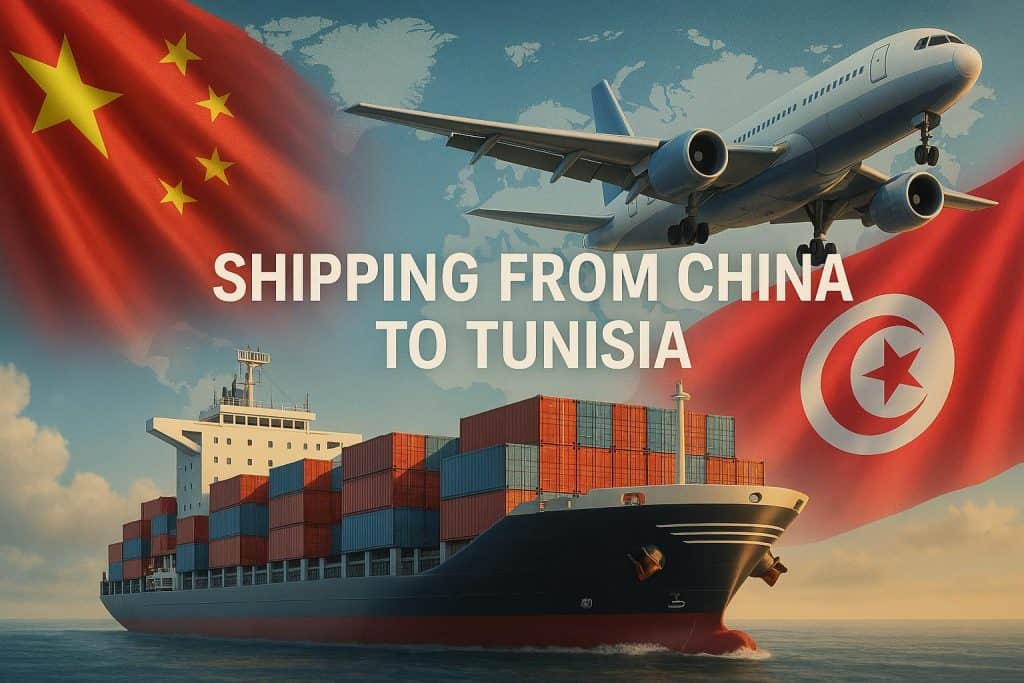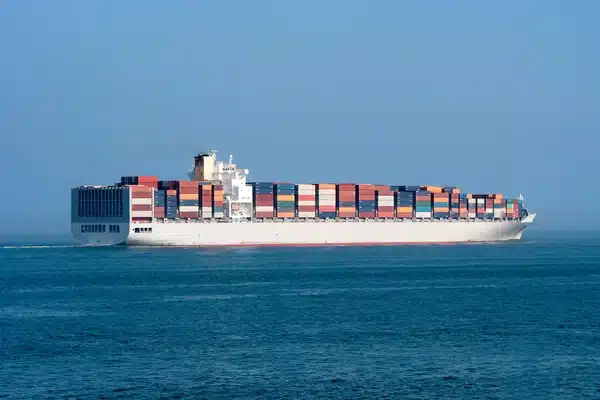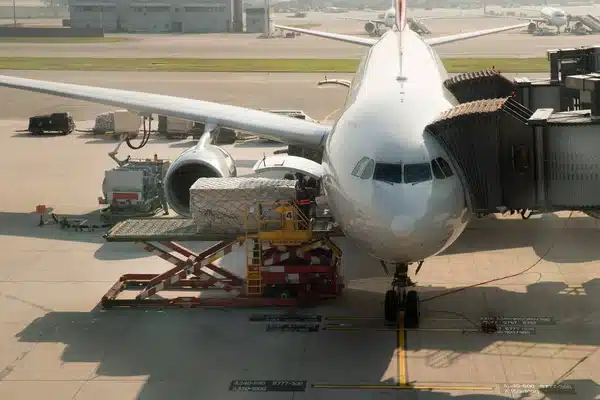This article will detail the different shipping options available for transporting goods from China to Tunisia, such as sea freight, air freight, or express courier. It will provide an in-depth analysis of their respective cost structures and the factors that affect these costs. With this knowledge, you can make an informed decision on which method is the most cost-effective for your specific requirements when considering the shipping cost from China to Tunisia.
Whether you’re seeking the best budget price route to Tunisia from China or simply want to find the best route to Tunisia from China for business or personal shipments, including personal effects cargo from Guangzhou China to Tunisia, this guide offers insights and pricing comparisons to help you decide efficiently. key shipping methods including sea freight, air freight, and door-to-door services. Whether you are managing large-scale commercial shipments or relocating with personal effects cargo from Guangzhou China to Tunisia, we provide clear pricing, delivery timelines, and expert advice to support your logistics decisions.
Key Takeaways
Shipping methods from China to Tunisia include sea freight, air freight, and express courier services, each offering distinct advantages and cost structures.
Sea freight is the most economical option for large volumes, while air freight provides faster delivery for urgent shipments, with costs based on weight.
Factors such as shipment size, type of goods, and chosen routes significantly influence shipping costs, making it crucial for businesses to optimize these elements for effective logistics management.

Overview of Shipping Costs from China to Tunisia
Transporting merchandise from China to Tunisia can be accomplished through various channels, each with distinct pricing structures and benefits. The main methods are:
Ocean freight, particularly using container vessels, which typically presents the most cost-effective option for substantial quantities
Air cargo services suited for expedited or valuable goods transportation
Quick delivery courier services that provide fast transit times at a higher rate
Each mode of transport offers unique advantages tailored to specific shipping requirements.
Given its prime position along the Mediterranean shoreline, Tunisia serves as an essential nexus in international trade routes, adding to its appeal for global shipments. Shipping costs are subject to fluctuate significantly due to factors like the nature of items being sent, volume of shipment and selected method of transport. Recognizing these elements is crucial when aiming to refine your logistical endeavors and control the overall expenses associated with shipping effectively.
Sea Freight Costs
Shipping goods in large quantities via sea freight is an economical choice. The expense of transporting a full 20-foot container is estimated to be between $1,000 and $2,000, whereas the cost for a full 40-foot container typically lies within the range of $1,500 to $2,500. This pricing structure makes it an appealing option for companies engaged in sending bulk goods by sea. One must account for extra charges such as those related to customs clearance, which can add around $100 to $200 per cubic meter.
The costs associated with sea freight are closely tied to both the volume and weight of the cargo being shipped. It serves as an optimal solution when dealing with Full Container Loads (FCL), aligning with international shipping guidelines while leveraging skilled forwarding agents who focus on ensuring expedient and reliable transport services. Choosing containerized maritime shipment provides a steadfast approach for managing substantial consignments efficiently and effectively.
Air Freight Costs
Utilizing air freight for transportation allows for the quickest delivery option, with prices ranging from $5 to $12 per kilogram based on how promptly you need your goods delivered and what they are. For shipments needing rapid transit or containing expensive items, air freight is an excellent choice, given that the average cost of sending a kilogram by air from China to Tunisia is about $6.3.
Though it may be pricier than sea freight, opting for air cargo services can greatly reduce transit times to just 3-6 days. Yet businesses should proceed with caution regarding any concealed fees and ensure that weight calculations are precise to prevent unforeseen charges.
Sea Freight Costs from China to Tunisia

Shipping goods in large quantities via sea freight is the most economical option when transporting cargo from China to Tunisia. It’s especially suitable for businesses dealing with bulk goods, as it allows for better cost-efficiency through Full Container Load (FCL) services.
Sea Freight Rates (Copy-Friendly Table)
Container Type | Route Example | Estimated Cost (EUR) | Transit Time (Days) |
|---|---|---|---|
20ft FCL | Shanghai → Tunis | $1,000 – $1,500 | 21 – 25 days |
40ft FCL | Shenzhen → Sfax | $1,500 – $2,300 | 22 – 26 days |
LCL (per CBM) | Ningbo → Rades | $100 – $200 / CBM | 23 – 27 days |
Note: Rates vary based on season, fuel surcharges, and carrier availability. For the latest price, feel free to contact us for a quote.
Sea freight is particularly ideal when:
You’re shipping more than 15 CBM of goods.
Time is flexible and delivery within 3–4 weeks is acceptable.
You want to reduce the overall shipping cost per unit.
While sea shipping offers a budget-friendly method, it’s essential to factor in extra charges such as:
Customs clearance fees (approx. $100–$200/CBM)
Documentation and port handling
Inland delivery if not using door-to-door service
By partnering with an experienced freight forwarder, you can consolidate goods, optimize packaging, and minimize total costs.
Air Freight Costs from China to Tunisia
For time-sensitive or high-value shipments, air freight from China to Tunisia is the fastest and most reliable method. Though more expensive than sea freight, it drastically reduces delivery time — ideal for urgent business needs or sending personal effects cargo from Guangzhou China to Tunisia.
Air Freight Rates (Copy-Friendly Table)
Weight Category | Estimated Rate (USD/KG) | Transit Time | Notes |
< 45 kg | $6 – $10 | 3 – 5 days | Higher cost due to small weight |
45 – 100 kg | $5.5 – $8 | 3 – 5 days | Balanced option for urgent small cargo |
100 – 300 kg | $4.8 – $7 | 3 – 5 days | Popular range for SMEs |
> 300 kg | $4– $6 | 3 – 6 days | Best rate per kg for larger air shipments |
Average cost for standard goods: around $5/kg. Actual prices vary based on cargo type, airport pairs, and airline fuel surcharges.
Main airports in China:
Guangzhou (CAN) — ideal for personal effects cargo
Shanghai Pudong (PVG)
Hong Kong (HKG)
Arrival airport in Tunisia:
Tunis-Carthage International Airport (TUN)
Key Considerations:
Volumetric weight charges apply:
Hidden fees: terminal charges, security screening, and customs processing
If you’re looking for the best budget price route to Tunisia from China with short delivery times, air freight is your most efficient option.

Door-to-Door Shipping from China to Tunisia
Door-to-door shipping services simplify the entire logistics process by combining freight, customs clearance, and final delivery into one seamless solution. This method is especially convenient for businesses that want stress-free international shipping without handling each step individually.
Whether you’re importing machinery, consumer electronics, or e-commerce parcels, a reliable DDP (Delivered Duty Paid) or DAP (Delivered at Place) service ensures peace of mind and accurate cost expectations.
Door-to-Door Shipping Rates (Copy-Friendly Table)
Shipping Mode | Cargo Type | Weight/Volume | Estimated Cost (USD) | Transit Time |
|---|---|---|---|---|
Sea Freight DDP | General cargo | 1 CBM / ~200–300 kg | $30 – $550 / CBM | 25 – 35 days |
Air Freight DDP | Small electronics | <100 kg | $6 – $12 / kg | 6 – 9 days |
Express Courier | Documents/samples | <10 kg | $45 – $90 (fixed) | 3 – 6 days |
E-commerce Parcels | Apparel, gadgets | <20 kg | $6 – $8 / kg | 10 – 14 days |
Prices include pickup in China, international freight, customs clearance in Tunisia, and final delivery to the recipient.
Door-to-door services typically include:
Export & import customs clearance
Packaging, labeling, pickup
Final-mile delivery to Tunis, Sfax, or any major city
Real-time tracking (for courier/air options)
Advantages of Door-to-Door Shipping:
No need to handle port formalities or hire separate customs brokers
Ideal for small businesses or first-time importers
Transparent pricing and fewer unexpected delays
Things to Watch Out For:
Ensure your freight forwarder clearly specifies whether duties/taxes are included (DDP) or excluded (DAP).
Provide accurate HS codes and declared values to avoid customs issues.
Door-to-door shipping, though more costly than self-managed logistics, offers unmatched convenience, time savings, and predictability — especially for importers unfamiliar with Tunisian customs procedures.
Factors Influencing Shipping Costs from China to Tunisia
The cost of shipping items from China to Tunisia is impacted by a variety of elements such as the shipment’s size and weight, the nature of the goods being transported, along with the selected routes and timetables for shipping.
For companies looking to refine their shipping process and handle logistics effectively, it’s essential to grasp these factors.
Shipment Size and Weight
Shipping expenses are heavily influenced by the dimensions and mass of the items being transported. Utilizing a Less than Container Load (LCL) is financially prudent for smaller consignments, as charges correspond with the amount of space occupied. In contrast, opting for a Full Container Load (FCL) tends to be more budget-friendly when dealing with substantial quantities since it offers uniform pricing per container, potentially resulting in notable cost reductions.
For economical and effective conveyance, it’s vital to pick an appropriately sized container—20ft units suit lesser loads while 40ft containers accommodate bulkier ones. Enterprises should meticulously evaluate both size and weight of their cargo to determine which shipping technique will prove most economically efficient.
Type of Goods
Shipping costs are also affected by the nature of the items being transported. Specialized handling for hazardous materials can result in extra expenses because they are subject to stringent regulations. Products with a high value may necessitate enhanced insurance and security measures while in transit, thereby influencing the total cost of shipping.
Shipping Routes and Schedules
Choosing the appropriate shipping routes and schedules can decrease expenses while guaranteeing that deliveries arrive on time. Typically, direct shipping routes from major ports in China to those in Tunisia are both faster and more economical. Changes to these shipping routes during different seasons can affect the timeliness of delivery as well as associated costs, particularly at times of high demand.
When goods are transported from China to Tunisia, several factors come into play which determine transit times. These include the point of departure and arrival ports, weight of shipment, and type of cargo being moved. By understanding these elements and planning accordingly, companies can fine-tune their shipping process for maximum cost efficiency.
Comparing Different Shipping Methods
There are multiple methods for transporting goods from China to Tunisia, such as:
Sea freight
Air freight
Door-to-door services
Express courier services
It’s important to evaluate each method based on its unique benefits and pricing frameworks in order to identify the option that best aligns with your business requirements.
Sea Freight vs. Air Freight
Shipping high-volume cargo from China to Tunisia is most cost-efficient when using sea freight, with expected delivery times ranging between 21 and 25 days. This method is best suited for shipments that are not time-sensitive. Conversely, air freight can transport goods within a shorter timeframe of just 3 to 6 days but incurs a greater expense—about $5 per kilogram for consignments over 1000 kg.
When selecting the appropriate shipping method, businesses need to evaluate various aspects including the shipment’s urgency, overall cost implications, and the weight of the goods being transported. Air freight stands as an optimal choice for expedited or less heavy deliveries. Larger loads benefit significantly from sea freights’ more budget-friendly offerings.
Door-to-Door Services
Services that offer door-to-door shipping handle everything from customs clearance to transportation, providing a seamless service that combines multiple logistics steps. Firms such as Tonlexing encompass all aspects of this process, including packing, transporting, and navigating customs procedures, to facilitate an effortless experience for their clients when they need to transport goods.
Opting for door-to-door services presents benefits like streamlined logistics management, punctual arrivals of shipments, and attentive handling of sensitive items. Nevertheless, these conveniences carry a premium price tag. Businesses must consider the trade-off between the ease provided by comprehensive door shipping services and the additional costs incurred.
Express Courier Services
Courier services that specialize in express delivery can transport packages from China to Tunisia within a rapid timeframe of 2 to 5 days. Renowned carriers such as FedEx, UPS, and DHL offer dependable express air freight options, which come with the advantage of advanced tracking systems and expedited customs clearance processes.
Such express services are exceptionally suited for consignments that are less than 1 CBM or weigh approximately 100/150 kg (220/330 pounds), guaranteeing swift transportation for shipments that are critical time-wise. The quickness and dependability provided by these courier services render them an optimal selection for deliveries requiring urgency.
To find out about shipping costs from China to the rest , you can click:
20FT & 40FT Container Shipping Costs from China to Nigeria
20ft & 40ft Container Shipping Costs from China to Kenya
Shipping Costs for 20ft & 40ft Containers from China to Russia
20ft & 40ft Container Shipping Costs from Taiwan to the USA
Cost of 20ft and 40ft Container Shipping from China to Japan
Budgeting for Shipping Costs
For companies to effectively oversee their logistics budget, it is crucial to allocate funds appropriately for shipping expenses. Recognizing the different elements that impact these costs and employing various methods and instruments for precise cost predictions allows businesses to refine their shipping process while preserving their financial success.
Estimating Total Shipping Cost
Calculating the overall cost of shipping requires an examination of several elements, including chargeable weight—which is established by taking the greater amount between gross weight and volumetric weight—fees related to customs clearance, and any supplementary expenses. Utilizing tools such as web-based calculators or obtaining estimates from trustworthy suppliers can assist companies in determining their precise shipping expenditures.
It is essential for businesses to have a clear grasp of what constitutes chargeable weight, as this information plays a pivotal role in providing an accurate estimation of costs. Being knowledgeable about these details enables organizations to effectively manage their logistics finances and circumvent unforeseen charges.
Reducing Shipping Costs
Maintaining profitability and competitive pricing hinges on the ability to cut down shipping costs. By using tactics such as negotiating improved shipping rates through the advantages of high volume or scheduling deliveries during off-peak times, substantial cost savings can be achieved. Utilizing platforms such as Alibaba allows companies to fine-tune their shipping strategies for enhanced efficiency and reduced expenditure.
Businesses that engage in astute negotiations and make strategic use of these shipping platforms can achieve a notable decrease in their total shipping expenses. It is also important for businesses to look into options like consolidating multiple shipments into one and enhancing packaging methods with an eye toward expense reduction.
Understanding Additional Costs
The total shipping cost can be substantially inflated by extra expenses like customs duties, import taxes, and insurance. The amount of customs duties charged is contingent upon the classification of goods according to the Harmonized System (HS) code and these rates can differ greatly.
For businesses, it’s crucial to ensure that all documentation is thorough as this can result in considerable savings when going through customs clearance. A precise grasp of these extra charges is essential for financial planning and preventing unforeseen costs.
Navigating Customs and Legal Compliance
Dealing with legal obligations and adhering to customs regulations is an essential component of international shipping. Companies based in Tunisia encounter various obstacles, including the intricacies of transport processes, clearing items through customs, and meeting regulatory standards for imports coming from China.
It’s crucial for these companies to pay meticulous attention to paperwork and abide by all relevant laws to guarantee compliance with legal requirements.
Required Shipping Documents
When preparing to ship items from China to Tunisia, it is crucial to have all the necessary shipping documents in order. These include commercial invoices that specify the value and sales conditions for customs clearance, packing lists for confirming the contents of cargo against what has been declared, and bills of lading which act as proof of ownership and provide information about the shipper, recipient, and transport provider.
For certain specialty goods that are being shipped, Material Safety Data Sheets (MSDS) might also be mandatory.
Attention must be paid towards ensuring accurate documentation along with appropriate packaging and labeling in readiness for shipment.
Customs Regulations and Import Duties
It is critical to adhere to the customs regulations of Tunisia and be aware of any import restrictions and duties when shipping items there. Although China and Tunisia do not share a Free Trade Agreement (FTA) or Economic Partnership Agreement (EPA), preferential tariffs can apply under the Asia-Pacific Trade Agreement (APTA). The total cost for calculating the customs value, on which import duties are based, includes both the price of the product as well as international shipping and insurance expenses.
The calculation for import duties involves taking this Customs Value (CV) and applying it against the relevant Customs Duty Rate. Take wooden furniture with HS code 9403 coming from China. It will attract a tariff rate of 20%. Imported goods in Tunisia have a standard VAT rate that is currently pegged at 19%.
Precise categorization using Harmonized System codes is crucial since these classifications help establish appropriate duty rates as well as applicable taxes.
Delivered Duty Paid (DDP)
Under the Delivered Duty Paid (DDP) incoterm, sellers bear all responsibilities and costs associated with shipping goods to Tunisia. This encompasses managing logistics, navigating customs clearance procedures, and settling any relevant import duties. As a result, buyers are relieved of these tasks.
By adopting DDP terms in their transactions, sellers commit to overseeing both logistics and customs formalities fully. This arrangement is especially advantageous for companies aiming to streamline their shipping process while guaranteeing prompt delivery without entangling themselves in the intricacies of customs regulations.

Role of Freight Forwarders
Freight forwarders are vital in linking shippers with transportation providers, optimizing the efficiency and efficacy of logistics operations. These entities oversee several elements within the shipping process, such as securing cargo space reservations, managing necessary paperwork, and guaranteeing that goods are delivered promptly.
Selecting a dependable freight forwarder is crucial for enhancing both efficiency and cost-effectiveness when transporting items from China to Tunisia.
Choosing a Freight Forwarder
When opting for a freight forwarder, it’s essential to assess their proficiency, garner endorsements based on favorable testimonials, and verify the range of services they provide. Investigating what the freight forwarder brings to the table is critical before finalizing your choice. The selection of an air freight forwarder should be predicated on their demonstrated experience and dependability.
Engaging a dependable freight forwarder can dramatically improve your shipping process by guaranteeing deliveries that are both prompt and adhere to international shipping norms. Companies need to seek out those with a solid history of success who are also capable of addressing particular requirements related to shipping.
Tracking Services
Shippers can keep a real-time watch on their shipments from China to Tunisia thanks to the tracking services available. These services, offered by many freight forwarders, improve transparency and reliability in the shipping process by keeping businesses constantly updated on the status of their shipments.
For express shipping, especially, having tracking capabilities is advantageous because it allows for immediate delivery and swift resolution of any arising issues. This boosts the efficiency of the entire shipping process while offering reassurance to businesses involved.
Additional Logistics Services
To enhance shipping operations, freight forwarders provide a suite of supplemental logistics services. These encompass expert packaging designed to safeguard merchandise and the provision of cargo insurance to bolster security while goods are in transit. During transportation, items encounter various hazards such as damage and loss that differ from risks present during warehouse storage.
The effectiveness of warehousing is paramount for triumphant logistics management, underscoring the importance of appropriate storage strategies. Inadequate warehousing practices can obstruct smooth logistics operations. Hence it is imperative for companies to select freight forwarders that deliver extensive logistics management solutions.
Summary
The process of transporting merchandise from China to Tunisia encompasses multiple shipping techniques, each with distinctive cost implications and advantages. Businesses can streamline their shipping operations and control expenses by comprehensively assessing the elements affecting shipping costs, contrasting the array of methods available, and adeptly handling customs duties as well as legal requirements. Opting for an appropriate freight forwarder coupled with employing supplementary logistics services can significantly boost operational effectiveness while guaranteeing punctual arrival of goods. Meticulous organization combined with precise focus on details enables companies to facilitate a smooth and trouble-free transit experience, thereby safeguarding earnings within their international commerce activities.
Frequently Asked Questions
What are the main shipping methods from China to Tunisia?
The primary shipping methods from China to Tunisia are sea freight, air freight, and express courier services. Each option varies in terms of cost and delivery speed, allowing you to choose based on your specific needs.
How much does sea freight cost from China to Tunisia?
The cost for sea freight from China to Tunisia typically ranges from $1,000 to $2,000 for a 20-foot container and from $1,500 to $2,500 for a 40-foot container.
What factors influence shipping costs from China to Tunisia?
Shipping costs from China to Tunisia are primarily influenced by shipment size and weight, the type of goods being shipped, as well as the shipping routes and schedules. Each of these factors plays a crucial role in determining the overall expense.
What are the benefits of using door-to-door shipping services?
Utilizing door-to-door shipping services provides stress-free logistics and ensures timely delivery, along with specialized care for delicate cargo.
This convenience simplifies the shipping process for customers.
How do customs duties impact shipping costs?
Customs duties can substantially raise shipping costs as they are calculated based on the Harmonized System code classification and the customs value of the goods.
This increase in total costs should be considered when budgeting for international shipments.
What’s the best budget price route to Tunisia from China for small shipments?
If you’re shipping less than 1 CBM, consider air freight or consolidated LCL sea freight. For personal shipments, door-to-door DDP is often the best budget price route.
Can I ship personal effects cargo from Guangzhou China to Tunisia easily?
Yes! We offer dedicated services for personal effects cargo from Guangzhou China to Tunisia, including packing, pickup, customs clearance, and final delivery.
What’s the best route to Tunisia from China for business cargo?
For commercial shipments, sea freight FCL is ideal for large volume. For faster delivery, air or courier from Guangzhou, Shenzhen, or Shanghai is the best route to Tunisia from China.
Whether you’re managing a business shipment or sending personal effects, understanding the best route to Tunisia from China helps ensure timely, cost-effective delivery. We specialize in both commercial cargo and personal effects cargo from Guangzhou China to Tunisia, offering flexible logistics solutions at competitive prices.
Looking for advice on the best budget price route to Tunisia from China for your cargo? Contact us for a customized quote!


